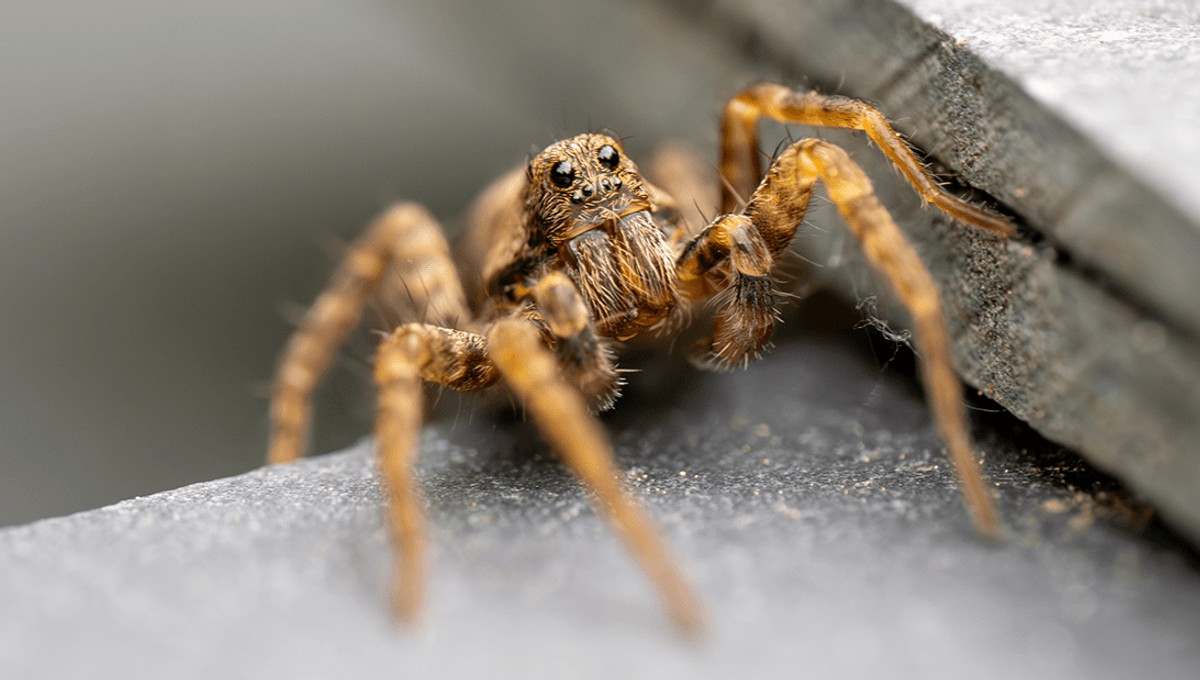How Big Is This Spider? Study Explains Why You Might Overestimate Their Size

How Big Is This Spider? Study Explains Why You Might Overestimate Their Size
It's a fairly common scenario: Someone (usually me) in your home informs you that there is a gigantic spider in the bathroom that needs dealing with, only for you to go up there and find a teeny tiny spider minding its own business, far smaller than described. A new study has looked into this size misestimation phenomenon a little further, asking participants to estimate the size of a spider and comparing it to the actual size.
In the study – aimed at testing fear-driven perceptual biases – participants were shown images of butterflies, wasps, and spiders and simply asked to estimate the size of the beastie in front of them. The participants were put into three groups based on their levels of knowledge of spiders, and their fear response to them, gained from further survey questions. The expert group was recruited via targeted email, while the non-experts were subdivided into those who had a highly fearful response to spiders and those who did not, based on their response to unpleasantness rating questions and a spider phobia questionnaire. "Perceptual bias refers to the tendency to interpret sensory information subjectively. Numerous research studies have proposed that emotions, valence, knowledge and beliefs can contribute to the emergence of such perceptual biases," the team explain in their paper. "For instance, individuals with social anxiety tend to perceive strangers as physically closer than do those without such anxiety. This distortion in spatial perception may reflect heightened vigilance towards potential social threats." ⓘ IFLScience is not responsible for content shared from external sites. People have been shown to believe that spiders are larger than they actually are in previous studies, but this is the first to compare people with a fear response to a control, as well as a group of experts. Experts have also been shown to have perceptual biases, which the team also aimed to investigate. The participants viewed 90 images, containing 30 butterflies, 30 wasps, and 30 spiders of various sizes, with butterflies chosen as the control, and wasps chosen for being vaguely threatening, but not self-relevant to those who fear spiders. "It is important to note that because participants were not asked to provide exact sizes, we attribute accuracy in size estimation to representing the correct proportions between the sizes of the animals. That is, butterflies are larger than spiders, spiders are larger than wasps," the team explains. "As predicted, the findings indicated that fearful individuals rate spiders as larger than butterflies. This effect was not found among control individuals. Furthermore, experts exhibited relatively accurate size perception, indicating that their expertise and knowledge overcame any perceptual bias that may have occurred due to their expertise." Spider-fearing individuals rated spiders as around 1.17 times larger than the butterflies, while the control group (non-expert) rated the size of spiders and butterflies as roughly the same. Both groups were incorrect, with the butterflies used in the study generally being larger than the spiders. While spider-fearing individuals were worse in their estimations, the team puts this down to how even non-fearing individuals see spiders. "Studies indicate that spiders are considered threatening stimuli for many people, even those who are not specifically afraid of them. Additionally, cognitive biases toward phylogenetic stimuli, such as spiders, are also prevalent in healthy populations, and may also include size estimation biases," they write in their discussion. "In the current experiment, the unpleasantness reported by participants in the control group suggests that spiders are indeed more unpleasant than wasps and butterflies. This leads us to conclude that there may be a size bias toward spiders because they are inherently unpleasant to view. In other words, even among the general population, the perception of size may be influenced by the negative nature of the stimulus." Wasps, despite being seen as threatening and rated as more unpleasant than butterflies, were generally sized correctly by both control and fearful-of-spiders groups. "This may be due to the specific nature of arachnophobia, as spiders evoke stronger fear responses than other arthropods, even among non-phobic individuals." Experts, meanwhile, were found to be pretty good at the task of size estimation, with their expertise in the area thought to have overcome any perceptual biases. While an interesting study, showing that fear can alter people's perceptions of the size of some animals, the team says that it is limited by its use of photographs rather than actual animals, as well as a lack in diversity of species of wasp portrayed to the participants. In future, the team aims to see whether reducing the perceived threat and feelings of fear has an effect on the perception of the stimuli. The study is published in Cognition and Emotion.


